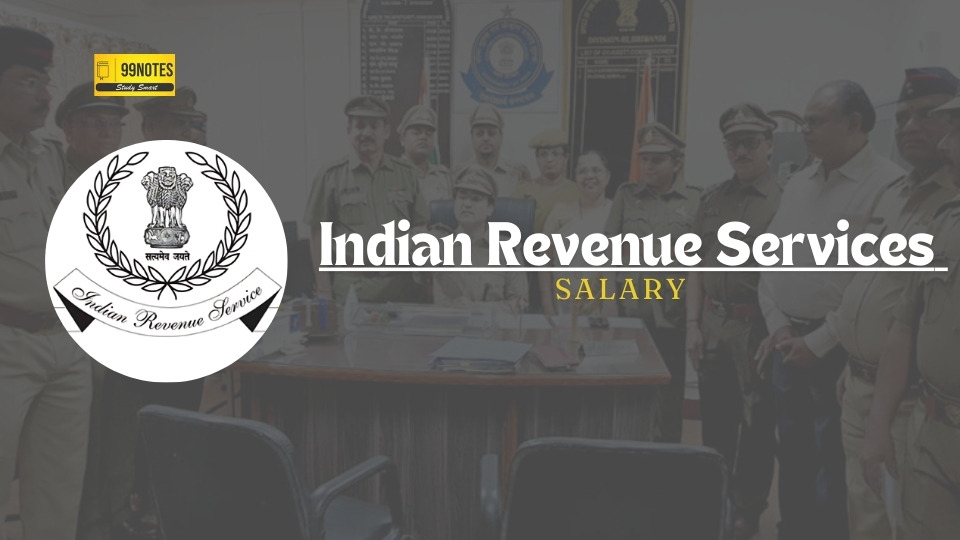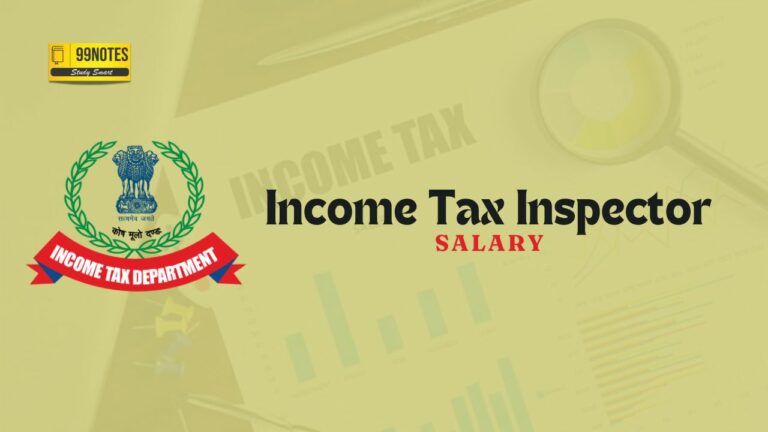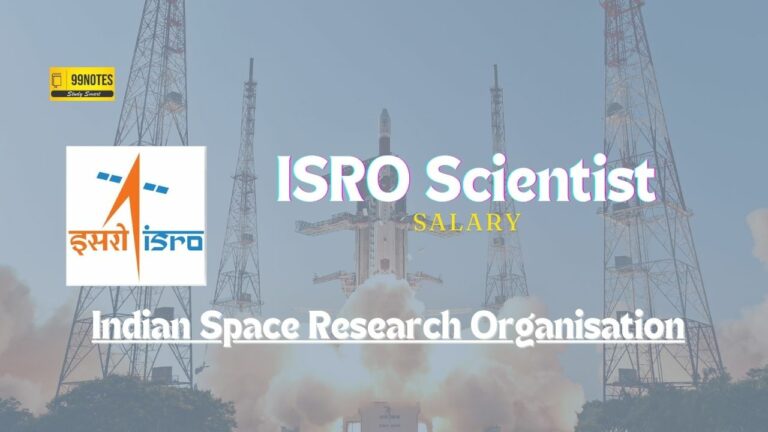IRS Salary- In Hand Per month, Grade Pay , Career Growth, Roles & Responsibility
IRS Salary- The starting salary of Indian Revenue Service (IRS) officers in India varies depending on the level of involvement. For an examination officer at junior level, the starting salary can be around INR.56,100 per month (basic salary INR. 56,100, 17% endearment allowance, house rent allowance and other benefits). As officers advance in their careers and are promoted, their salaries go up accordingly, along with additional bonuses and allowances.
IRS Salary Per Month 2024
The monthly salary of Indian Revenue Service (IRS) officers in India varies depending on their rank and pay scale as per 7th Pay Commission earns around ₹ 56,100 per month with basic salary and allowances Assistant Commissioner of Income Tax (ACIT) can earn around ₹ including 62,100 monthly salary of Principal Chief Commissioners f ₹ 1,56,200 can earn about ₹74,700 per month from monthly salary of income tax (CIT and Pr. CCIT) or possibly more, depending on their position and experience with IRS officials.
IRS Salary In Hand 2024
The In hand pay of Indian Revenue Service (IRS) officers in India is varies depending on deductions and allowances ranging from about ₹40,000 per month at Income Tax In the hands of Officer (ITO) after deducting provident of treasury (PF), income tax (if applicable), and other statutory deductions Salary can go up to ₹45,000 Salary of senior officers like Assistant Commissioner of Income Tax (ACIT) can range from ₹50,000 to ₹55,000 or more, depending on their allowances and deductions.
IRS Salary Structure Post- Wise
The following is the IRS (Indian Revenue Service) post-wise salary structure as per the 7th Pay Commission in a structured table form:
| Post | Pay Level | Basic Pay (INR) | Allowances* (INR) | Total Salary (INR) |
| Income Tax Officer (ITO) | Level 7 | 44,900 | 4,000 | 48,900 |
| Assistant Commissioner of Income Tax (ACIT) | Level 10 | 56,100 | 6,000 | 62,100 |
| Deputy Commissioner of Income Tax (DCIT) | Level 11 | 67,700 | 7,000 | 74,700 |
| Joint Commissioner of Income Tax (JCIT) | Level 12 | 78,800 | 8,000 | 86,800 |
| Additional Commissioner of Income Tax (Addl. CIT) | Level 13A | 1,21,200 | 10,000 | 1,31,200 |
| Commissioner of Income Tax (CIT) | Level 14 | 1,44,200 | 12,000 | 1,56,200 |
| Principal Chief Commissioner of Income Tax (Pr. CCIT) | Level 15 | 2,25,000 | 15,000 | 2,40,000 |
Note: The figures provided are approximate and may vary based on location, years of service ( experience), and specific allowances applicable.
Perks & Allowances in IRS
The following are the perks and allowances in which the Indian Revenue Service (IRS) offers various benefits and incentives to its employees, enhancing their overall remuneration:
- Dearness Allowance (DA): This is adjusted from time to time to prevent inflation, thereby increasing the purchasing power of the seniors.
- Home Rental Allowance (HRA): It is Paid to policyholders on housing costs, varying depending on placement.
- Transportation Allowance: The TA is Reimburses police officers for transportation costs.
- Medical Assistance: The medical Benefits covers the medical expenses of officers and their dependents.
- Leave Travel Concession (LTC): The officers can travel with family on leave and reimburse travel expenses.
- Phone/Mobile Allowance: Covers communication costs.
- Professional Development Support: This Helps executives pursue professional learning and training of IRS.
- Risk Coverage: Covers the risk of certain IRS transactions.
- Transport Allowance: Compensates officers for official transportation expenses.
The allowances along with other benefits such as pensions, insurance coverage, and access to government agencies, contribute significantly to the overall compensation and welfare of IRS officers.
Roles & Responsibilities of IRS
The following Roles and Responsibilities of Indian Revenue Service (IRS) encompasses various functions in the tax and income administration of the country:
- Income Tax Officer (ITO): To Conduct tax audits, audits and investigations to ensure compliance with income tax laws and it helps taxpayers understand tax laws and accurately also to Identify tax evasion or fraud by scrutinizing financial documents and transactions.
- Assistant Commissioner of Income Tax (ACIT): To Supervise a team of ITO-tax analysts in the implementation of tax laws and regulations and also help in reviewing tax audits and audit reports to ensure accuracy and accuracy with handling tax disputes providing resolution in accordance with tax law.
- Deputy Commissioner of Income Tax (DCIT): Oversees multiple tax jurisdictions to ensure consistency and fairness in tax administration and Oversee tax targets, revenue forecasts, and budget allocations with a Coordinate with other government agencies and departments on tax-related matters.
- Joint Commissioner of Income Tax (JCIT): To Establish tax policies, procedures and procedures consistent with national tax objectives and conduct training programs for IRS officers and employees to improve tax literacy to represent the department at meetings, and tax advisory committees.
- Additional Commissioner of Income Tax (Addl. CIT) / Commissioner of Income Tax (CIT): To Provide strategic direction and leadership in tax administration at the regional or national level which may handle complex tax matters, litigation, and logistical challenges with the laise with international tax authorities on cross-border tax and exchange of information.
- Principal Chief Commissioner of Income Tax (Pr. CCIT) / Chief Commissioner of Income Tax (CCIT): To Lead an area or area of the IRS, overseeing all tax activities and operations with set long-term tax goals, compliance goals, and business plans with the IRS in high-level government meetings, and tax reform initiatives.
About IRS- Indian Revenue Service
The Indian Revenue Service (IRS) is a prominent and important civil service in India which conducts tax administration and revenue collection under the Ministry of Finance. In IRS the employees are recruited through the Civil Services Examination conducted by the Union Public Service Commission (UPSC).
Indian Revenue Service (IRS) officials serve in a variety of positions, including income tax officers (ITOs), deputy commissioners, and commissioners whose Career development is structured at the IRS, with officers advancing through promotions, training programs, and skills development programs. The IRS have also played a key role in developing tax policies, implementing tax reforms and combating tax evasion and fraud.
IRS provide the competitive salary, attractive benefits and professional development opportunities and making it a prestigious career for individuals who want to help support India’s economic growth and financial management
Career Growth in India Revenue Service
Career development in the Indian Revenue Service (IRS) is established and gives a clear path for advancement and the officers normally start as Income Tax Officers (ITOs) and can develop to better ranks consisting of Assistant Commissioner of Income Tax (ACIT), Deputy Commissioner of Income Tax (DCIT), and Commissioner of Income Tax (CIT) primarily based on overall performance, level in, and qualifying assessments.
With each promotion, officials tackle extra responsibilities, take care of complex cases, and lead groups. Senior positions like Principal Chief Commissioner of Income Tax (Pr. CCIT) or Chief Commissioner of Income Tax (CCIT) offer leadership roles overseeing nearby or national tax management, policy formula, and strategic making plans. Professional improvement possibilities, education programs, and publicity to diverse tax eventualities make contributions to the continuous profession boom of IRS officers.
How to Join Indian Revenue Service in India?
The following steps to join the Indian Revenue Service (IRS) in India:
- Eligibility: Age around 21-32 years and meet educational standards, usually a bachelor’s degree from a recognized university or institute.
- Civil Service Examination (CSE) : Pass the CSE conducted by the Union Public Service Commission (UPSC), which includes basic, main and interview rounds.
- Choose IRS: Fill up the UPSC application form and choose IRS as your preferred service.
- Crack the exam: Now Prepare well for the exam, cover topics like General Studies, Aptitude and Optionals etc.
- Interview: Go through the interview portion of UPSC where candidates’ skills, personality and eligibility for IRS are tested.
- Training: Once selected, undergo training at Lal Bahadur Shastri National Academy of Administration (LBSNAA) and National Academy of Direct Taxes (NADT) in Nagpur before performing IRS duties.
Conclusion
The Indian Revenue Service (IRS) remuneration system offers competitive and lucrative salaries to its employees. With a variety of benefits including Dearness Allowance (DA), Home Rent Allowance (HRA), Transportation Allowance, and other benefits also the employees enjoy financial stability and incentives.
The Starting salaries and experience-based promotions ensure performance on an ongoing path with attractive rewards and the incentives such as medical stipends, professional development grants, and leisure travel access contribute to work-life balance. Overall, IRS compensation reflects the value of the dedication, and accountability of its employees in tax and public service.



